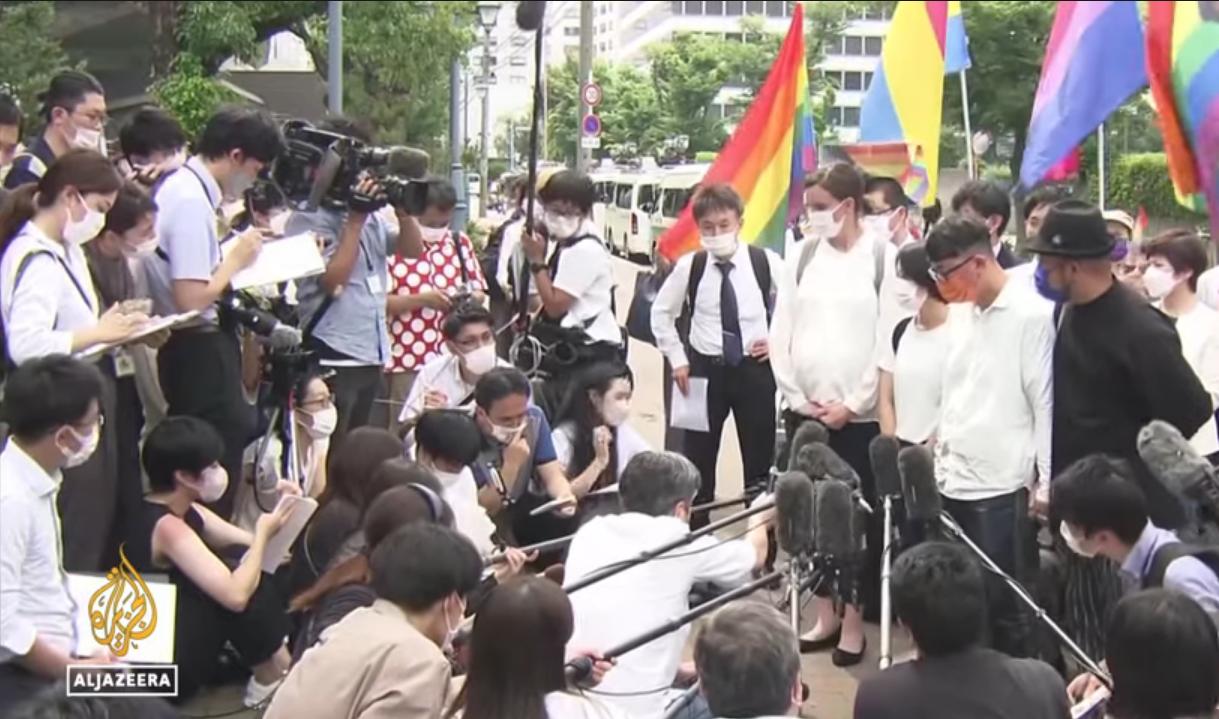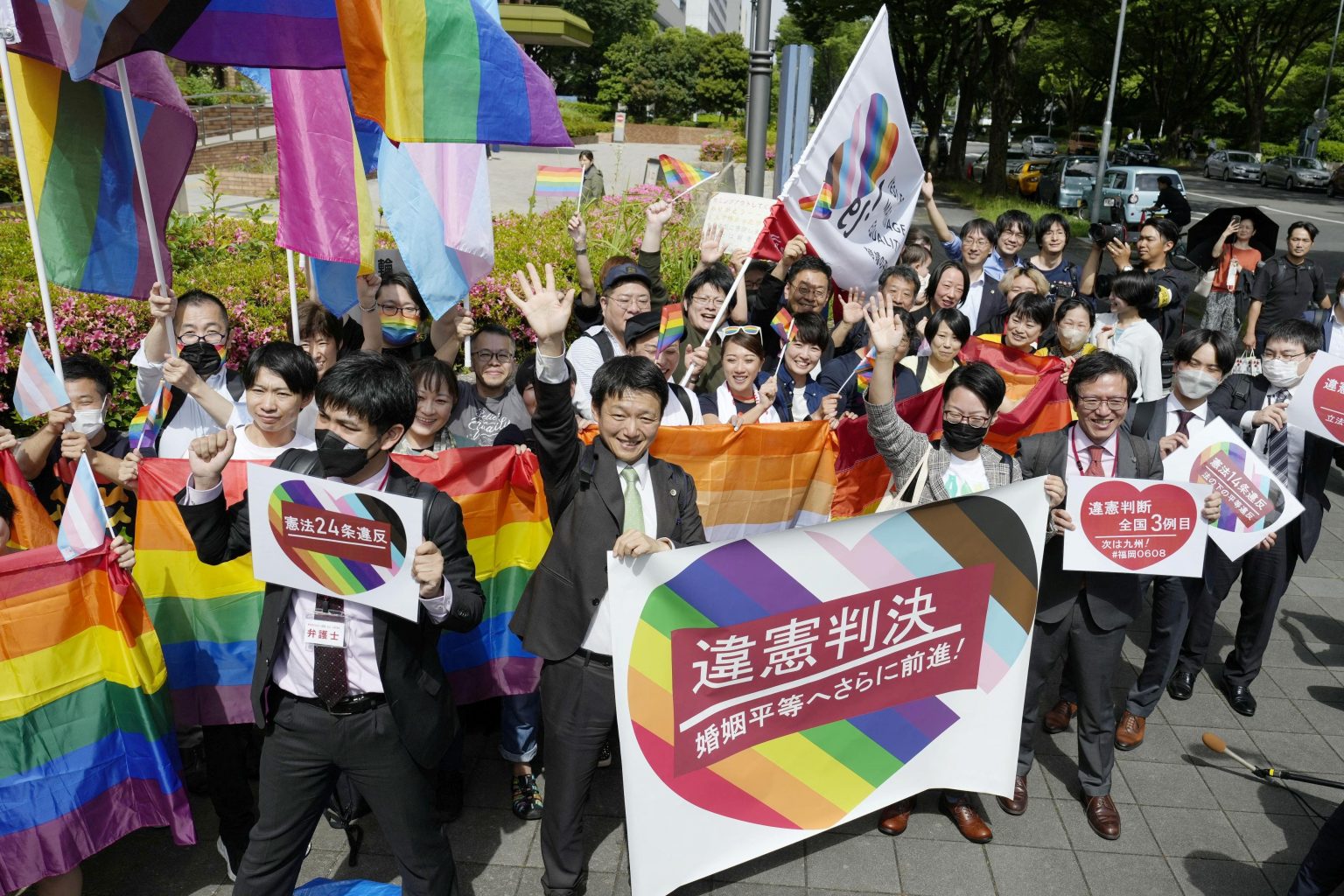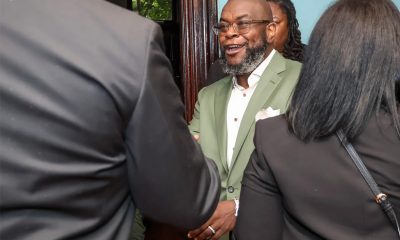Asia
Japan court rules country’s same-sex marriage ban is constitutional
Case filed in Osaka

In a ruling issued Monday, a district court in Osaka said that the country’s ban on same-sex marriage was not unconstitutional. The case had been filed by three same-sex couples — two male, one female — and is only the second legal challenge to have been filed in Japan.
In March 2021, the Sapporo District Court ruled the country’s constitution does not ban same-sex couples from legally marrying and ensures them a right to marry. Under current Japanese law, same-sex couples are banned from legally marrying, which means partners cannot inherit each other’s assets upon death and have no parental rights over the other’s child.
In the Sapporo case, Nikkei Asia reported three couples — also two male and one female — tried to register their marriages in 2019, but local officials turned them away.
The couples sued and the court ruled the government’s actions violated two provisions of the Japanese Constitution: Article 14 that ensures the right to equal treatment and Article 24, which does not expressly deny the right of marriage to same-sex couples.
Reuters reported that the Osaka court ruling said that marriage was defined as being only between opposite genders and not enough debate on same-sex marriage had taken place in Japanese society.
“We emphasised in this case that we wanted same-sex couples to have access to the same things as regular couples,” said the lawyer for the couples, Akiyoshi Miwa, adding that they would appeal.
Reuters also reported that while Prime Minister Fumio Kishida has said the issue needs to be carefully considered, his ruling Liberal Democratic Party has disclosed no plans to review the matter or propose legislation, though some senior party members favor reform.
An upcoming case in Tokyo will keep alive public debate on the issue, particularly in the capital, where an opinion poll by the local government late last year found some 70 percent of people were in favor of same-sex marriage.
Japanese court upholds same-sex marriage ban:
India
LGBTQ poets included in India’s premier literary festival
Sahitya Akademi seen as mirror of government’s cultural agenda

India’s premier literary institution on March 7 announced it would allow LGBTQ poets to participate in its marquee Festival of Letters in New Delhi.
The Sahitya Akademi, often seen as a mirror of the government’s cultural agenda, for the first time allowed these poets into a high-profile poetry reading at the Rabindra Bhavan. They shared the stage with more than 700 writers across 50 languages.
Culture and Tourism Minister Gajendra Singh Shekhawat kicked off the Festival of Letters with Mahesh Dattani, the acclaimed English-language playwright famed for his provocative works, as the main guest. Dubbed Asia’s grandest literary gathering, the Sahitya Akademi took place over six days under the “Indian Literary Traditions” theme.
The 2025 Festival of Letters showcased a sweeping range of voices — young writers, women writers, Dalit authors from marginalized castes, Northeast Indian scribes, tribal poets, and LGBTQ poets — cementing its reputation as a literary kaleidoscope.
Kalki Subramaniam, a leading transgender rights activist and author, on March 9 chaired a literary session titled “Discussion on Literary Works of LGBTQ Writers in the 21st Century,” which spotlighted contemporary queer voices.
“It was enriching to listen to the profound thoughts of LGBT writers from various parts of the country in their speeches,” said Subramaniam. “The session was particularly memorable with the participation of A. Revathi Amma from Tamil Nadu, Reshma Prasad from Bihar, Sanjana Simon from New Delhi, and Devika Devendra Manglamukhi and Shivin from Uttar Pradesh and Aksaya K Rath from Orissa.”
Subramaniam discussed how global politics shape gender rights and the persistent erasure of trans identity, urging a unified push for solidarity within the LGBTQ community. She stressed the vital need to elevate queer works and writers, casting their voices as essential to the literary vanguard.
“It was a pleasure to meet great writers from around the country in the festival as well as meet my writer activist friends Sajana Simon and Revathi Amma after a long time,” said Subramaniam.

The government on March 12, 1954, formally established the Sahitya Akademi. A government resolution outlined its mission as a national entity tasked with advancing Indian literature and upholding rigorous literary standards; a mandate it has pursued for seven decades.
The Sahitya Akademi in 2018 broke ground in Kolkata, hosting the country’s first exclusive gathering of trans writers, a landmark nod to queer voices in Indian literature.
Hoshang Dinshaw Merchant, India’s pioneering openly gay poet and a leading voice in the nation’s gay liberation movement, on March 9 recited a poem at the Festival of Letters, his verses carrying the weight of his decades-long quest for queer recognition. He later thanked the session’s chair for welcoming the community, a gesture that underscored the event’s third day embrace of diverse voices.
The Sahitya Akademi in 2024 honored K. Vaishali with the Yuva Puraskar for her memoir “Homeless: Growing Up Lesbian and Dyslexic in India,” a raw account of navigating queerness and neurodivergence. Vaishali in a post-win interview reflected on India’s deep-seated conservatism around sexuality, noting she wrote from a place of relative safety — an upper-caste privilege that shielded her as she bared her truth. The award, she said, was the Akademi’s indelible seal on her lived experience, a validation no one could challenge.
The Sahitya Akademi’s inclusion of LGBTQ writers in its main program this year jars with the Bharatiya Janata Party-led government’s conservative stance, which, in 2023, opposed same-sex marriage in the Supreme Court, arguing it erodes Indian family values. Yet, under Shekhawat, the Sahitya Akademi’s spotlight on queer voices at the Rabindra Bhavan suggests it could be a tentative crack in a regime typically rooted in tradition.
The Festival of Letters hosted a translators’ meeting on March 10, spotlighting P. Vimala’s 2024 award-winning Tamil translation of Nalini Jameela’s “Autobiography of a Sex Worker,” a work steeped in marginalized voices that include queer perspectives.
This platform gained significant support from the BJP-led government, with Shekhawat securing a 15 percent budget increase to ₹47 crore ($5.63 million) in 2024. In Tamil Nadu state, however, Dravida Munnetra Kazhagam’s Chief Minister Muthuvel Karunanidhi Stalin, has long opposed such cross-linguistic efforts, fearing dilution of Tamil identity amid decades of anti-Hindi sentiment — a tension the Sahitya Akademi’s inclusive showcase sought to bypass.
‘The Akademi is very inclusive and has a friendly festival ambience,” Subramaniam told the Washington Blade.
Japan
Japan’s marriage equality movement gains steam
Nagoya High Court this month ruled lack of legal recognition is unconstitutional

Japan’s Nagoya High Court on March 7 ruled the lack of legal recognition of same-sex marriages violates the country’s constitution.
The plaintiffs argued Japan’s Civil Code and Family Registration Act, which does not recognize same-sex marriages, violates the country’s constitution. They cited Article 14, Paragraph 1, which guarantees equality under the law and prohibits discrimination based on factors that include race, creed, sex, or social status. The plaintiff also invoked Article 24, Paragraph 2, which emphasizes that laws governing marriage and family matters must uphold individual dignity and the fundamental equality of the sexes.
The plaintiffs sought damages of 1 million yen ($6,721.80) under Article 1, Paragraph 1, of the State Redress Act, which provides for compensation when a public official, through intentional or negligent acts in the course of their duties, causes harm to another individual. The claim centered on the government’s failure to enact necessary legislation, which prevented the plaintiff from marrying.
The court noted same-sex relationships have existed naturally long before the establishment of legal marriage. It emphasized that recognizing such relationships as legitimate is a fundamental legal interest connected to personal dignity, transcending the confines of traditional legal frameworks governing marriage and family.
The court further observed same-sex couples encounter significant disadvantages in various aspects of social life that cannot be addressed through civil partnership systems. These include housing challenges, such as restrictions on renting properties, and financial institutions refusing to recognize same-sex couples as family members for mortgages. Same-sex couples also face hurdles in accessing products and services tailored to family relationships. While the court deemed the relevant provisions unconstitutional, it clarified that the government’s failure to enact legislative changes does not constitute a violation under the State Redress Act.
The lawsuit, titled “Freedom of Marriage for All,” brought together a large coalition of professionals, including more than 30 plaintiffs and 80 lawyers. They filed six lawsuits in five courts throughout Japan.
“We filed these lawsuits on Valentine’s Day, Feb. 14, 2019, in Tokyo, Osaka, Nagoya, and Sapporo, and in September of that year in Fukuoka,” noted Takeharu Kato, director of Marriage for All Japan. “Then, in March 2021, the Sapporo District Court handed down the first ruling declaring the current laws unconstitutional, which received extensive worldwide media coverage. Subsequently, the Osaka District Court unfortunately ruled that the current law is constitutional, but among the 10 rulings handed down so far, nine have ruled that not recognizing marriage equality is unconstitutional.”
Kato is a lawyer who is part of the legal team in the Sapporo case. He is also a board member of Marriage for All Japan, a marriage equality campaign.
“The MFAJ (Marriage for All Japan) is fully supporting the lawsuits by publicizing the current status of the trials and the rulings in our websites and social networks, setting up press conferences at the time of the rulings,” Kato told the Washington Blade. “We also make the best of the impact of the lawsuits in our campaign by holding events with the plaintiffs of the lawsuits and inviting them to the rally at Diet (the Japanese parliament) members’ building.”
Kato said the campaign has significantly shifted public opinion, with recent polls indicating more than 70 percent of Japanese people now support marriage equality — up from approximately 40 percent before Marriage for All Japan launched. He also noted 49 percent of Diet members now back marriage equality.
Japan is the only G7 country that does not legally recognize same-sex couples. Taiwan, Nepal, and Thailand have extended full marriage rights to gays and lesbians.
Expressing disappointment, Kato said many Japanese politicians continue to resist marriage equality, despite overwhelming public support. Kato added Marriage for All Japan expects the Supreme Court to rule on their lawsuits in 2016.
“We believe that the Supreme Court will also rule that the current laws are unconstitutional,” he said. “However, the Supreme Court’s ruling alone is not enough to achieve marriage equality under the Japanese legal system. We should put more and more strong pressure on the Diet to legalize marriage equality in Japan as soon as possible.”
Several municipalities and prefectures issue certificates that provide limited benefits to same-sex couples, but they fall short of equal legal recognition.
Prime Minister Fumio Kishida’s government has faced mounting pressure on the issue as public support for marriage equality has surged in recent years. Kishida has yet to push reforms within his own party; encountering fierce opposition from its traditional leadership.
His government in June 2023 passed Japan’s first law addressing sexual orientation and gender identity, aiming to “promote understanding” and prevent “unfair discrimination.” Activists, however, widely criticized the legislation on grounds it fails to provide comprehensive protections or extend marriage rights to same-sex couples.
India
LGBTQ Indians remain vulnerable to dating app scammers
Gay man in Mumbai lost nearly $11K in 2024

Swiping right has become a pricey trap for many in India, where Grindr and other dating apps serve as stalking grounds for scammers spinning fake profiles, sob stories, and shattered promises. This deception hits the LGBTQ community hardest, with reports indicating hundreds of people are duped each year.
The modus operandi of these scams unfolds when an LGBTQ user connects with a match on Grindr or Tinder, someone claiming to be from the U.S. or Europe, and the texts spark a flawless romance, until a frantic call shatters the illusion. They’ve flown to India to meet them, they say, but customs officials at the airport have detained them for carrying wads of foreign cash. A desperate plea follows: Send money to settle fines, with a hollow vow to repay once released—a vow that vanishes the moment the payment lands.
Although dating apps have tightened policies to shield users—Match Group, Tinder’s parent company, rolled out a campaign across Tinder, Hinge, Match, Plenty of Fish, and Meetic with in-app tips to spot scams—fraud persists. Delhi Police on Jan. 11 busted a gang that targeted gay men on Tinder, luring them with fake profiles promising shared desires, then holding them hostage to extort cash. A minor was among the five people who authorities arrested.
Though India decriminalized homosexuality in 2018, lingering social stigma still marks LGBTQ people as prime targets for dating app scammers.
Noida police in Uttar Pradesh state in 2020 dismantled a gang that honey-trapped at least 10 professionals on a gay dating app, robbing two of them of $500 and $1,700 respectively. Gurugram police in Haryana, a bustling tech and finance hub, that same year nabbed another gang that preyed on more than 50 users of the same app.
Scammers often dig deep, coaxing out home addresses, job details, and family ties from their targets—sometimes with an accomplice who turns violent, assaulting the victim. Activists, however, note most of them don’t come forward to the police, silenced by India’s staunchly conservative mores that allow catfishers to slip away and target more people unchecked.
A 28-year-old gay man in Mumbai in March 2024 fell prey to a dating app scam, losing nearly $11,000 to a man posing as a Texas-based doctor.
After striking up a friendship online, the scammer promised an expensive watch as a gift—only to call the next day, claiming he’d been detained at Delhi’s airport for carrying a hefty sum of foreign currency. Moments later, a supposed customs officer named Priya demanded $859 in taxes to secure his release. What began as a single payment spiraled into a financial abyss, with the victim funnelling roughly $11,000 in a month, the Indian Express reported.
“These incidents have grabbed headlines recently. Scammers create fake profiles, build trust with their targets, and then hit them with extortion demands, threatening to out them to family or friends, said Ankit Bhuptani, an LGBTQ activist who founded Queer Hindu Alliance. “It’s a cruel twist of the knife, preying on the fear of societal rejection that still lingers despite legal progress.”
“Even though the Supreme Court struck down parts of Section 377 in 2018, decriminalizing homosexuality, the reality on the ground is that acceptance isn’t universal,” added Bhuptani. “Families and communities can still be harsh, and these scammers weaponize that vulnerability. The fact that arrests have been made—like those recent busts in Ghaziabad and Noida—shows the police are acting, but the persistence of these scams tells us we have got a long way to go.”
Bhuptani noted that a mix of technological, societal, and legal challenges fuels these scams. He said scammers thrive because dating apps can be a Wild West—fake accounts are easy to set up, and AI tools make them even more convincing.
“I have heard of cases where victims lost lakhs (thousands of US dollars), like that guy in Ghaziabad who was blackmailed for 1.4 lakhs ($1,700) after being filmed in a compromising situation. It’s predatory and shameless,” said Bhuptani. “The emotional toll is just as bad as the financial hit—imagine the terror of being outed in a society where many still see being gay as taboo.”
Bhuptani argued India’s legal framework is primed to tackle dating app scams, pointing to constitutional protections—Article 14’s equality guarantee and Article 15’s anti-discrimination shield the Navtej Johar ruling, which decriminalized homosexuality in 2018, bolstered. He noted that blackmail and extortion already fall under Indian penal code Sections 383 and 384, while the IT Act can pin scammers for online fraud and identity theft.
“The problem isn’t the laws; it’s enforcement and awareness. Police need better training to handle queer-specific cases with sensitivity, and dating apps must step up—think stricter verification, AI-flagging of suspicious profiles, and user education on spotting red flags,” said Bhuptani. “But laws alone won’t fix this. Society’s got to shift. As long as being LGBTQ carries a stigma, scammers will have leverage. We need campaigns—loud, bold ones—pushing acceptance, normalizing queer identities, and making it clear that outing someone is not a weapon that works anymore.”
Pune police, meanwhile, on Feb. 27 filed an First Information Report against a gang that blackmailed a gay man on a dating app, bleeding him of $1,248 over five months.
-

 Maryland3 days ago
Maryland3 days agoAt transgender visibility celebration, Moore called out for lack of action
-

 National3 days ago
National3 days agoDestination Tomorrow works to empower LGBTQ community
-

 Arts & Entertainment3 days ago
Arts & Entertainment3 days ago‘Think of those who have not been seen,’ Cynthia Erivo’s powerful message at GLAAD Awards
-

 Africa2 days ago
Africa2 days agoReport: Anti-LGBTQ discrimination has cost East African countries billions










